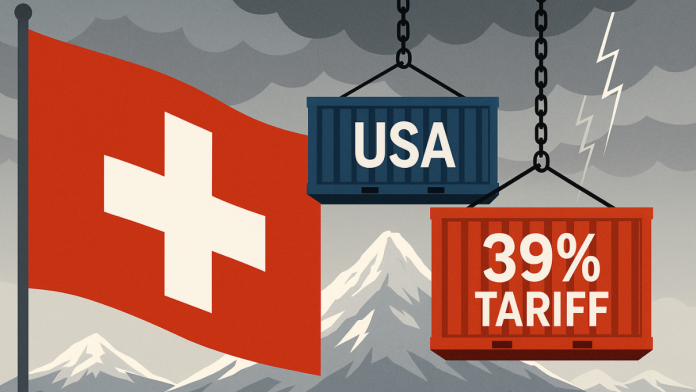Switzerland, long admired for its calm diplomacy and strict neutrality, has just been hit by a harsh economic surprise. The United States has imposed a sweeping 39% tariff on Swiss goods — a rate far higher than the 15% applied to the European Union. For a small but wealthy country that rarely finds itself at the center of global trade conflicts, this move has sparked outrage, confusion, and serious concern.
The shockwaves are being felt across Swiss politics and business, especially within the powerful pharmaceutical industry. Major firms like Novartis AG and Roche Holding AG now face an uncertain future, while Swiss leaders scramble to understand how a nation known for peace and cooperation became the latest target in America’s tariff war.
A 39% Tariff Blow That Stunned the Alps
This new tariff policy from the Trump administration has blindsided Swiss officials and companies alike. At 39%, the trade penalty is more than double the rate applied to the EU — and it comes with no clear warning. Analysts at Nomura estimate the economic damage could wipe out 1% of Switzerland’s GDP, an alarming figure for one of the world’s most stable economies.
Tariff victory, domestic defeat — South Korea’s silent service sector collapse
Pharmaceutical companies are especially vulnerable. Although they have been given a brief reprieve, a 25% tariff on drug exports is still being threatened. Novartis AG and Roche Holding AG, both giants in global medicine, are watching closely. Roche recently announced a massive $50 billion investment in the United States, hoping to strengthen ties — but it may not be enough to shield the sector.
Swiss media have reacted with disbelief, comparing the situation to the Battle of Marignano in 1515, when Swiss troops suffered a historic defeat. The current loss is not on the battlefield but in the global marketplace — and it’s no less painful.
Why Neutrality Didn’t Help This Time
For years, Switzerland believed that its neutral stance and diplomatic gestures would keep it safe from economic retaliation. That belief is now being questioned. Under the leadership of President Karin Keller-Sutter, Swiss officials had made a strong effort to build goodwill with Washington. They signed major deals, avoided criticism, and even bought U.S. fighter jets.
Keller-Sutter had previously celebrated a brief pause in U.S. tariff threats, believing that friendly talks had worked. But the new measures reveal a very different reality: the Trump administration is acting unilaterally, with mercantilist policies that don’t spare even cooperative allies.
Washington has accused Switzerland of currency manipulation and points to a $38 billion goods trade surplus as evidence that it’s benefiting unfairly. The Swiss National Bank disagrees, especially since much of that surplus comes from gold refining — a neutral, low-margin business. But facts seem to matter less than perceptions, and Switzerland’s quiet diplomacy has failed to change those.
Despite major investments in U.S. industries, Swiss businesses are being penalized. The assumption that staying friendly would offer protection has collapsed — and with it, confidence in the power of neutrality.
Trump unleashes tariff blitz, teases cash payouts for Americans: ‘We should’ve done this years ago
Alone in the Storm While Unity is Missing
Switzerland’s position also highlights a bigger problem across the global economy: countries are trying to solve tariff problems alone, rather than together. In July, the Kiel Institute for the World Economy proposed a joint response involving the EU, Canada, South Korea, and other key exporters. Together, they represent half of all goods shipped to the U.S. — enough to apply real pressure.
But that coalition has yet to form. Each country, including Switzerland, has chosen to pursue separate deals. The result? A fragmented response that gives the U.S. more power to pick off targets one by one.
In this case, Switzerland’s go-it-alone strategy has clearly failed. Despite offering investments, trade, and goodwill, it was hit with the toughest tariffs yet. Some Swiss politicians are now rethinking the country’s independent stance and suggesting deeper cooperation with the European Union.
The path forward remains unclear. What is certain, however, is that Switzerland’s belief in neutrality as a shield has taken a heavy blow — one that will be felt across its economy, political circles, and public opinion for months to come.


